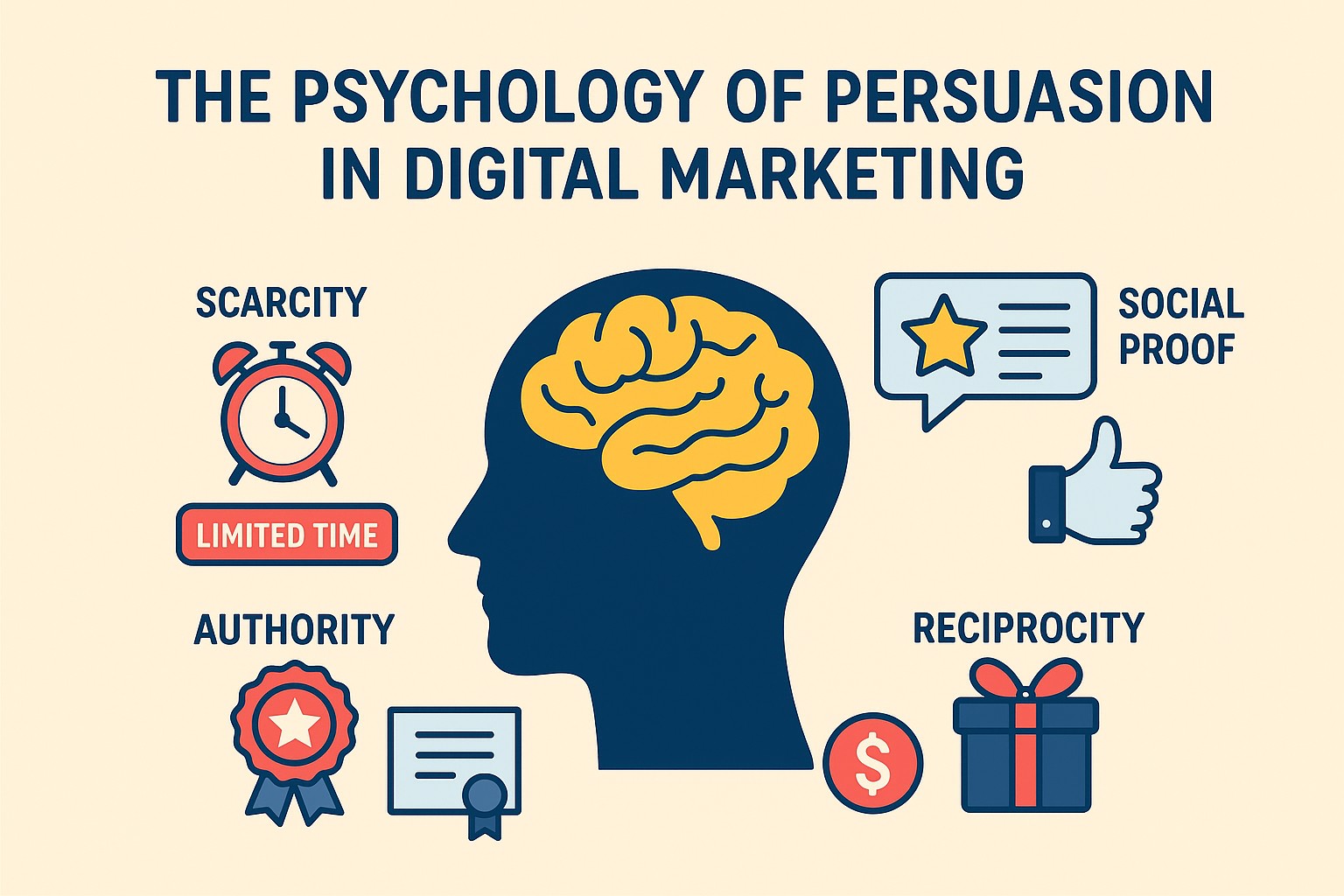 The Psychology of Persuasion in Digital Marketing
The Psychology of Persuasion in Digital Marketing
Introduction
In today’s competitive online world, getting people’s attention is hard — convincing them to take action is even harder. This is where the psychology of persuasion comes in. Successful marketers understand that every click, purchase, or sign-up is driven by human behavior, emotions, and decision-making patterns.
In this blog, we will explore how brands use psychological triggers like scarcity, social proof, authority, and storytelling to influence buying decisions in digital marketing.
Why Psychology Matters in Marketing
Marketing is not just about selling products; it’s about connecting with people. Every ad you see, email you open, or social media post you engage with is carefully designed to trigger certain emotions and behaviors.
By understanding how the human brain works, marketers can create campaigns that feel personal, relevant, and irresistible.
Example: When you see “Only 2 seats left at this price!” — it instantly creates urgency. This is not just marketing; it’s psychology at work.
1. Scarcity – The Fear of Missing Out (FOMO)
What is Scarcity in Marketing?
Scarcity is one of the most powerful persuasion techniques. People tend to value things more when they are rare or available for a limited time.
How to Use Scarcity in Digital Marketing
Limited-time offers
Countdown timers on product pages
Flash sales
Why Scarcity Works
The human brain is wired to avoid loss more than it seeks gain. When we think something might be gone soon, we act faster.
Example: Amazon’s “Only 3 left in stock” prompts shoppers to buy immediately.
2. Social Proof – People Follow People
What is Social Proof?
Social proof means that when we are uncertain, we look to others for guidance.
Forms of Social Proof in Marketing
Customer reviews and ratings
Testimonials
Influencer endorsements
User-generated content
Why Social Proof Works
We trust the opinions of others more than we trust a brand’s self-promotion.
Example: A restaurant with hundreds of positive Google reviews will attract more customers than one with no reviews.
3. Authority – Trusting the Experts
What is Authority in Marketing?
We are more likely to believe and follow advice from people or organizations we see as experts.
Ways to Build Authority
Featuring certifications and awards
Showcasing media mentions
Collaborating with industry leaders
Sharing expert insights
Why Authority Works
Authority reduces risk. If an expert recommends it, it must be good.
Example: Skincare brands often use dermatologists in ads to build trust.
4. Reciprocity – Give Before You Ask
What is Reciprocity?
Reciprocity is the idea that if someone gives us something, we naturally feel the need to give back.
How to Apply Reciprocity in Marketing
Offering free eBooks or guides
Providing free trials
Giving exclusive discounts to subscribers
Example: Many SaaS companies offer free tools or templates to attract potential customers.
5. Storytelling – Turning Products into Experiences
Why Storytelling Works
Our brains are wired to respond to stories more than facts. A good story creates emotional connections and makes a brand memorable.
Storytelling in Digital Marketing
Sharing customer success stories
Creating brand origin stories
Using videos to show transformation
Example: Nike’s ads often focus on athletes’ journeys, not just their shoes.
Conclusion
The psychology of persuasion is not about manipulating people — it’s about understanding their needs and motivations so you can offer real value.
By using strategies like scarcity, social proof, authority, reciprocity, and storytelling, marketers can create campaigns that are both ethical and effective.
In the end, great marketing is about building trust and making people feel understood. If you master the art of persuasion, your digital marketing efforts will always have an edge.